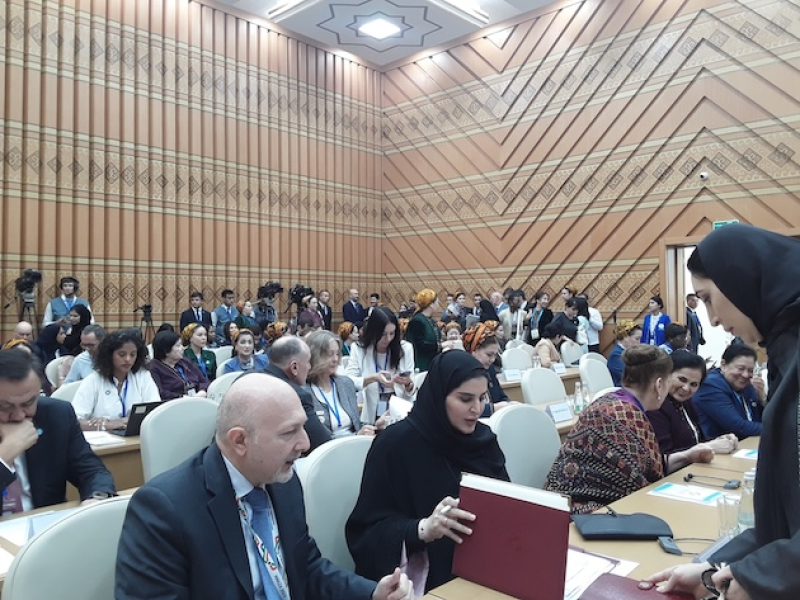- CA Yunus pays homage to Liberation War martyrs on Victory Day |
- Bangladesh capital market extends losing streak for second day |
- Bangladesh celebrates Victory Day Tuesday |
- 'Different govts presented history based on their own ideologies': JU VC |
Women in Landlocked Developing Countries Demand Equality

Maryam Al-Misnad (front centre), Minister of State for International Cooperation in Qatar, during the Women Leaders Forum in Awaza.
“Progress towards gender equality and equity remains uneven and far too slow. One in four women in landlocked developing countries (LLDCs) live in extreme poverty—nearly 75 million women,” said Rabab Fatima, Secretary-General of the Third United Nations Conference on LLDCs (LLDC3), ongoing in Awaza, Turkmenistan.
Fatima, who is also Under-Secretary-General and High Representative for the Least Developed Countries, LLDCs, and Small Island Developing States, highlighted the status of women in LLDCs, where nearly half (150 million) face food insecurity.
Speaking at the Women Leaders’ Forum organised by the UN OHRLLS, the government of Turkmenistan, and the Central Asian Women Leaders’ Caucus, she told participants that female labour force participation stands at 54 percent—significantly lower than the 70 percent for men in LLDCs—and that most women (80 percent) work in vulnerable, informal employment.
“In LLDCs,” she continued, “only 30 percent complete upper secondary education, less than half the global average. And in a rapidly digitising world, just 36 percent of women in LLDCs use the internet. This ratio will be even lower for women in rural and marginalised communities.”
Fatima said this scenario impedes sustainable development. “Empowering women is not only a matter of rights; it is an economic imperative. Nations rise when women thrive. That is why I would say women thrive when nations rise.”
Women from 32 landlocked developing countries—including Lesotho, South Sudan, Malawi, Mongolia, Bolivia, and Uzbekistan—gathered on August 7 to emphasise that including and empowering women in LLDCs is a strategic priority for the success of the Awaza Programme of Action, which seeks to accelerate implementation of the 2030 Agenda for Sustainable Development in LLDCs.
The event aimed to mobilise high-level political support for women’s full, equal, and meaningful participation in the next programme of action for LLDCs, share best practices, and identify recommendations to amplify women’s voices and opportunities.
Although the status of women in LLDCs is far from ideal, Dunyagozel Gulmanova, Speaker of Turkmenistan’s Parliament (Mejlis), and Tanzila Narbaeva, Chairperson of the Senate of Uzbekistan’s Oliy Majlis, symbolised what is possible.
Both spoke about their countries’ commitment to women’s empowerment and the strengthened role of women in society, highlighting women’s presence in high-level positions in politics, the judiciary, and the economy.
Gulmanova noted that women in Turkmenistan are entitled to 112 calendar days of maternity leave—56 days before and 56 days after childbirth—with benefits paid as a lump sum at the primary workplace. After maternity leave, women may take unpaid parental leave until the child turns three while retaining their jobs.
Uzbekistan is actively working to support women’s education from kindergarten to university, with a significant rise in women’s enrolment in higher education, including medical fields.
Maryam Al-Misnad, Qatar’s Minister of State for International Cooperation, stressed that women’s leadership “is not a dream. It’s a force for transformation.” Qatar “recognises the power of women,” she said.
“Women are not weak in this new world,” she continued. “They lead across all sectors: government, diplomacy, education, business, and innovation. Our national strategies unlock women’s full potential through progressive policies guaranteeing maternity protection, equal pay, leadership pathways, and respectful work environments.”
Young women leaders, often under-represented and on the periphery of leadership, now have seats at the table and are using them.
“Even as we discuss the Awaza Programme of Action, we must also consider how young women will be involved,” said Reekelitsoe Malopo from Lesotho.
“We know the challenges are vast,” she added, “but key issues remain: limited access to education and economic resources.”
“As young women in LLDCs, we face barriers to quality education and relevant skills and training vital for our futures and the rapid technological transformation underway,” she observed.
In the face of these challenges, Fatima reiterated that the Awaza Programme of Action calls for gender-responsive industrial and development policies tailored to national contexts, prioritising rural industrialisation, entrepreneurship, formalisation of informal work, and stronger partnerships across society.
“At the United Nations, we remain fully committed to gender parity. Today, women comprise 46 percent of UN international staff and 55 percent of under-secretary-general positions—the highest level,” she said.
The UN Secretary-General launched the UN System-Wide Gender Equality Acceleration Plan on March 8, 2024, to accelerate progress on gender equality within the UN system. This flagship initiative builds on existing commitments and aims to transform internal structures for more effective gender equality.

